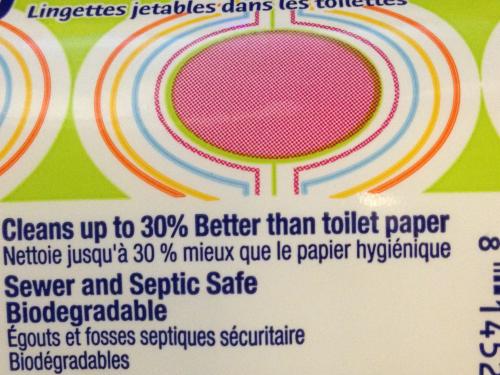Are flushable bathroom products safe for sewer and septic systems?
In recent years, the use of products such as pre-moistened "flushable" wipes have been advertised as a way to feel "cleaner" and "fresher" but most don't know they have caused damage to wastewater systems across the country.
There are many relatively new bathroom products on the market today that are advertised as a better cleaning experience when compared to traditional toilet paper. These products’ labels indicate they are safe for sewers and septic systems. In addition to wipes, there are also other cleaning products that are labeled as “flushable” which may go down the toilet but they are not breaking down sufficiently enough. This has led to clogged pipes and jammed pumps in sewer systems across the country. “Ragging” refers to the phenomenon in which flushable wipes for adults and toddlers combine with other items such as extra-thick toilet paper, toilet cleaning wand pop-off pads, baby wipes, paper towels, sanitary pads, dental floss and other items that are not designed to be flushed that get tangled up in sewer pipes.
Flushable wipes are marketed in a variety of ways, such as “septic-safe,” “breaks down like toilet paper,” and “safe for sewer and septic.” The problem is that they appear to take longer to break down when compared to traditional toilet paper, and as a result have caused major blockages in sewer systems. Aging infrastructures have also compounded the problem. Wipes that clog pipes can lead to blockages that can cause sewage overflow into basements or streams.
According to a recent Washington Post article on flushable wipes clogging sewer systems, the Washington Suburban Sanitary Commission, which handles sewage for 1.8 million people, recently spent more than $1 million to install grinders to shred wipes and other debris so it won’t clog treatment plant pumps. Officials with DC Water, the District’s water and sewer agency, also reported more than 500 man-hours were used over the past 12 months to remove stuck pipes and repair broken equipment, and an estimated 35 percent increase in broken pumps and clogged sewer lines over the past few years.
This issue also seems to be harmful to septic systems. In Oakland County, Mich., there are over 80,000 septic systems that can potentially be impacted. Oakland County Environmental Health Division manager/health officer Kathy Forzley recently urged residents to think before they flush wipes and other bathroom products which may result in clogged pipes, pumps and the need to replace or upgrade septic systems. This material and others can build up and require pumping and servicing more often.
At the heart of the issues is the fact that utilities believe manufacturers of flushable products are not conducting disintegration tests for flushable wipes that mimic actual conditions in real-life sewer systems. Manufacturers don’t agree with this claim, and say their test results provide scientific evidence that wipes are safe for sewer and septic systems. Due to the many issues across the country as well as internationally, the issue of what is considered “flushable” and what specific testing that should be conducted to determine whether a product breaks down adequately enough to be flushed or not will likely continue to garner increased interest. A short video produced by Consumer Reports is helpful in introducing the public to the potential danger of flushable wipes.
If you are concerned about whether flushable products area causing and/or have caused a problem to your system, stop flushing the items in question. Instead, bag them and place them in your garbage for collection. When in doubt, just because an item says it can be flushed doesn’t mean it should be. Contact your local health department or sewer utility that handles wastewater in your area for more information.
For more information on good septic system maintenance, read the Michigan State University Extension septic article series:



 Print
Print Email
Email



